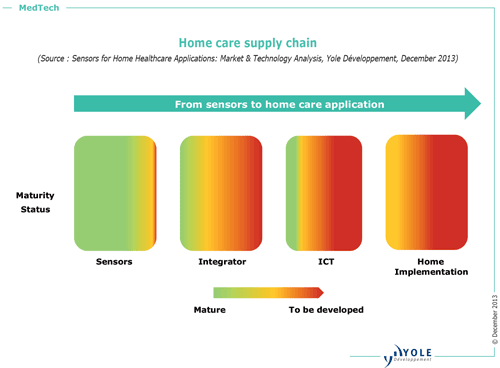In December, Yole Développement announced its Sensors for Home Healthcare Applications: Market & Technology Analysis report. Yole Développement’s report provides a complete overview of today and tomorrow’s advanced home care applications, identifying the most promising ones. Also, this report describes market trends and challenges, incl. forecasts, detailed supply chain and a special focus on Information and Communication Technologies (ICT).
Sensors for home care will explode over the next five years
From 2000 to 2050, the proportion of the world’s population aged 60 and over will grow from about 16% to 25% – an increase linked to a marked growth of chronic diseases (Alzheimer’s, diabetes, cancers, etc.). Healthcare systems’ rising costs and a physicians’ shortage are paving the way for increased home care.
“Sensors previously developed for non-medical applications are transitioning to home care applications, and the market for sensors dedicated to home care applications is poised to grow from $559M in 2013 to $1.2B by 2018,” explains Benjamin Roussel, Project Manager, Medical Technologies, at Yole Développement.
During Yole Développement research, the following sensors were investigated: accelerometers, barometers, electrochemical biosensors, flow sensors, gyroscopes, humidity sensors, IR temperature sensors, magnetometers, microfluidic chips, microphones, photodetectors, pressure sensors, proximity IR sensors, RF MEMS, RFID, and strain sensors. For each sensor, Yole Développement’s report provides market data and unit/value forecasts.
Collectively, these sensors have numerous applications in the home care market, from fall detection systems to tremor monitoring in Parkinson’s disease.
Today, the three most-used sensors are photodetectors, pressure sensors and electrochemical sensors.
A highly segmented market
Home care, also called home healthcare, refers to the at-home care provided to a person with special needs. This includes people who are ageing, chronically ill, recovering from surgery, or disabled.
Transferring a patient from a hospital to his/her home implies a relocation of care systems. In order to maintain the same level of care quality with less human involvement, home care sensors are vital replacements for specific applications ordinarily performed by nurses, such as guaranteeing the patient’s comfort, ensuring their safety, monitoring body parameters and treatments, and drug delivery.
Using a disruptive segmentation, Yole Développement’s analysts have gathered all of the information necessary for understanding each application’s market needs.
Sensors for home care cover five segments: smart drug delivery – patient safety – diagnostics – continuous patient monitoring – patient comfort. For each segment, current and future medical devices and their related sensors are detailed.
Moreover, innovative products are presented, along with key integrators. ICT (Information and Communication Technologies) are critical ICT are becoming integral to home care applications, both for delivering and providing accessibility to healthcare for home-based patients with chronic illness. Although in recent years ICT have been increasingly used in healthcare, inter-country efforts have become fragmented, and could benefit from improved cross-border coordination. In this report, Yole
Développement analysts describe how ICT systems work, the benefits and drawbacks to using ICT in home care, and ICT’s remaining key challenges.
Speaking of these remaining challenges, there’s still a ways to go in order to improve infrastructure and personal communication devices. Yole Développement report lists several examples of companies/devices that are facilitating the necessary improvements.

Immature supply chain
Due to the entire system’s immaturity, the supply chain for sensors in home care applications is still under construction. Sensor players are prepared to supply qualified MEMS sensors, but integrators, ICT players and home implementation players still face many difficulties. This report devotes an entire chapter to the general challenges present at each supply chain level, and the main trends. The analysts also list the main players at each level, especially at the MEMS sensor level.
Pressure sensors, inertial sensors, flow sensors and other sensors used in home care applications are ready to be integrated!
About Sensors for Home Healthcare Applications: Market & Technology Analysis report:
o Authors:
Benjamin Roussel is a Project Manager at Yole Développement involved in microfluidic and medical technologies fields. He holds a pharmacy diploma from the University Claude Bernard Lyon, complemented by a master degree in Technology and Innovation Management from EM Lyon Business School.
Wenbin Ding is responsible for MEMS market research at Yole Développement. She previously worked at research enter CEA, Grenoble France. She holds a Microelectronics Engineering degree from the National Engineering School in Caen, plus a Master Degree in Business Administration from IAE Caen, France.
o Catalogue price:
Euros 5,990.00 (Full report – Multi user license) – Euros 2,990 (Executive Summary) – Publication date: December 2013.
For special offers and the price in dollars, please contact David Jourdan ( or +33 472 83 01 90).
Companies cited in the report:
Advocate, AirTrip, Alere Connect, AliveCor, Analog Devices, Asahi Kasei, Atlas, Avivo, BL Healthcare, Boehringer ingelheim, Cambridge Consultants, Corventis, Debiotech, Dias Infrared, Excelitas, Fitbit, Fraunhofer IIS, Freescale, Fujistu, Fukuda Denshi, GE Sensing, Heapsylon, Heimann, Hitachi, Honeywell, HSG-IMIT, Huiqin, IMEC, Instabeat, InvenSense, LG, LifeWatch, Lively, Lumoback, Massachusetts Institute of Technology, Measurement specialties, Mehregany Lab, Melexis, Microlife, MultiSense, Murata, Myca, mySkin, National Cancer Institute, National Institutes of Health, NEC Soft, Nicera, Nichii Gakkan, Nike, Novartis AG, NTT Group, Omron, Panasonic, Philips Healthcare, Proteus digital health, Qmedic’s, Qualcomm, Rehabilitation Institute of Chicago, ResMed, SBS Information Systems, Secom, Sensaris, Sense4Baby, Sensimed, SensorTechnics, SmartPill, Sony, Stanford University, STMicroelectronics, Tactilus, Teijin, Terumo, Toshiba, Tronics, Wellsense, Willcom, Xsens, Yongsheng, Yuyama.
About Yole Développement: www.yole.fr
Advertisement
Learn more about Yole Développement





